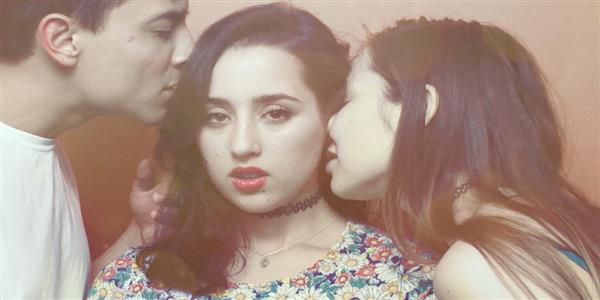In times like these, as we become increasingly disillusioned by the state of political affairs, we need films to keep us from slipping into the void. Ashley George, creator behind the queer narrative short, Sometimes, Forever, helps to remind us that film can be a meditation, carving out a space amongst the insanity.
Ms. George sheds light on some existential inquiries in her experimental work, much of which deals with principles of nostalgia, personal development and spiritual exploration. With work that verges on subversive, focusing on the somatic and celebrating the body, George directs a delicate dance of incarnated reality, a metamorphosis of psyche on the small screen.
I reached out to Ms. George via Facebook, hoping to chat about Sometimes, Forever, as well as her ventures in finding connection and remaining motivated as an independent filmmaker. Below is our conversation via email.
Sophia Cowley for Film Inquiry: I am always excited by LGBTQ representation in film, which is one of the aspects that drew me in to Sometimes, Forever. Where did the idea for the story come from?
Ashley George: The story is a twist on my own experience as a sexually confused girl living in a pretty straight, suburban world, so the narrative draws mainly from personal experience. A lot of “what ifs” went through my head when I wrote this film and began re-imagining how different my life would have been if I had made other decisions when I was a teen.

Before Sometimes, Forever, you had your roots in experimental filmmaking, as well as casting and producing films, correct? (I LOVED Heal, Heel.) Can you talk a bit about this shift from experimentation to the creation of narrative film?
Ashley George: I started working as a producer and casting director in San Francisco around 2009 and then took the leap into directing when I started working on Luma a few years later. Luma was my first film that was approached as a meditation on film. Anti-narrative, all about expanding consciousness of viewer and subject, and building my own language through image and sound.
The shift was fun and challenging – there was a learning curve. With Sometimes, Forever I went into production focused on the newness of directing a piece that had dialogue and feeling the need to abide by the narrative structures that experimental film doesn’t require, like having a beginning, middle and end, and creating a space for these characters to live in that effectively translated the story we’re presenting. I hope to have sorta married my experimental side with this new interest in upfront narrative in Sometimes, Forever.
You worked with Cinefemme to get this film made. Can you tell us about the role of community (specifically what it is like to be supported by a community of filmmakers) in realizing your own project?
Ashley George: The support meant so much to me and does with all of my projects! I’m involved in the Cinefemme, FilmmakeHer and NYC Women Filmmaker communities. I love my ladies in film. The love is real. There’s always a team of bad ass women around to help source crew, locations, whatever you need… It’s a sisterhood of filmmakers that inspire & engage and really want to help each other. Very happy I found them.
There’s always a team of bad ass women around to help source crew, locations, whatever you need…
What was the most challenging part of making Sometimes, Forever? The most rewarding?
Ashley George: Making Sometimes, Forever was pretty fun really. My motto is to embrace the chaos and we did that, for sure… Our art director did such a stellar job as she made amazing things happen in a short span of time and on a tight budget. My producer had to back a trailer up a hill in the snow and I’m sure he had a great time doing that! The most rewarding part of making Sometimes, Forever is screening it and hearing their thoughts and feedback – a lot of which is along the lines of, “that happened to me!” Most can relate to the awkward tension and confusion that the film explores – for better or worse.
My motto is to embrace the chaos and we did that, for sure…
The film seems to weigh heavily on nostalgia. What made you choose ’90s grunge as a backdrop for the film?
Ashley George: I’m obsessed with the ’90s. The music, the art, the fashion. It was a lot of fun to present the experience with a ’90s lens and sound.
What advice can you give to rising filmmakers, particularly those who have gotten their start in experimental or non-narrative film?
Ashley George: Challenge yourself and don’t be afraid to mess it up. Messy can be fun!
Thanks again to Ashley for the interview! To find out more about Ashley George and to stay updated on her projects, visit: http://filmsbyashley.com
What LGBTQ films have inspired you lately? Let us know in the comments!
Does content like this matter to you?
Become a Member and support film journalism. Unlock access to all of Film Inquiry`s great articles. Join a community of like-minded readers who are passionate about cinema - get access to our private members Network, give back to independent filmmakers, and more.